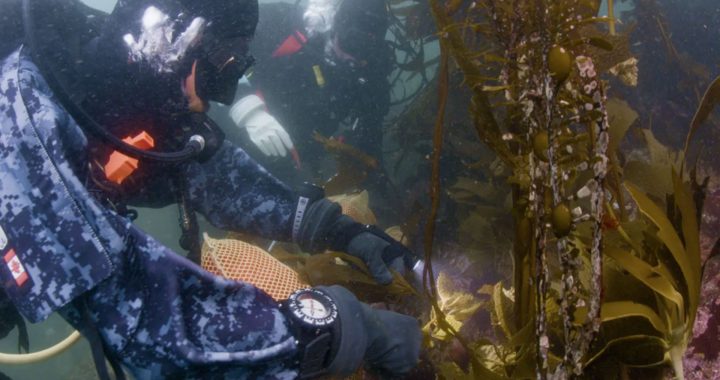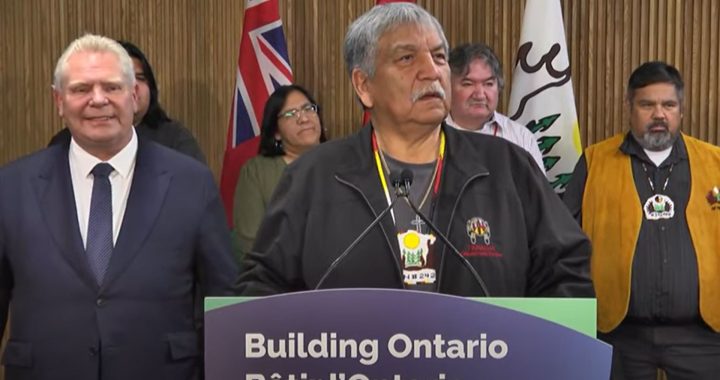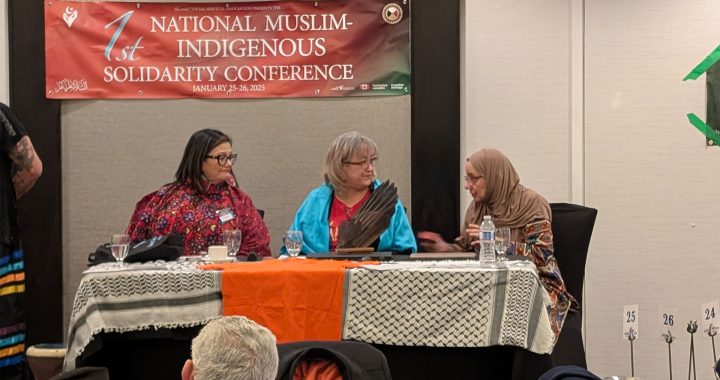An Edmonton police officer has been charged with assaulting a person during an arrest that took place Aug. 27, 2019 and caught on video.
Police say Const. Michael Partington, who has been with the force for four years, was arrested Tuesday.
The video shows Bigstone Cree Nation member Elliot McLeod being taken down by police by a single officer. Then Partington knees him in the back or neck.
Edmonton police said they received video of the arrest two days later and an investigation was conducted by its Professional Standards Branch.
“Upon completion of the investigation, (the Professional Standards Branch) concluded that the level of force described in the police report was not consistent with the force observed in the video,” police said in a news release.
Zack Elias, an Edmonton based defence lawyer, called the video “disturbing.”
“It’s pretty troubling to me that there is a video that is so credible and defies any explanation making that amount of force reasonable in any circumstance,” said Elias. “And yet it takes ten months for him to be suspended without pay and for charges to be brought.”
The case was referred to Alberta Crown Prosecution Services in Calgary in March to determine if a criminal charge was warranted. Prosecutors recommended Friday that Partington be criminally charged, police said.
“The constable was released via an appearance notice and has since been relieved from duty without pay,” Edmonton police said.
Naomi Sayers is an Alberta lawyer based in Ontario.
She said the video shows that both officers failed in their duty.
“The police officer, not just one but two engaged in an inappropriate, unprofessional standards of behavior that did not meet the standards set out for them,” she said.
There have been several cases in Alberta recently where police use of force has been questioned.
Earlier this month, two videos began circulating online of a 2018 arrest of a Black man in Edmonton where a police officer used his knee on the man’s neck to restrain him.
Edmonton police have said the restraint was used for about 40 seconds before the officer switched positions, but noted that such a tactic is not encouraged and not part of officer training.
Also, a video emerged last week of the violent arrest of Chief Allan Adam outside a casino in northern Alberta.
The Athabasca Chipewyan First Nation said the RCMP dash-camera video was released as part of a court application to get criminal charges against the prominent chief stayed.
The video shows an officer approaching Adam’s truck outside the casino in Fort McMurray on March 10 for what police say was expired plates on his truck. Adam is then seen getting in and out of the truck, aggressively removing his coat and swearing as he complains about being harassed by police.
A second Mountie pulls up, charges at Adam, tackles him to the ground and punches him in the head.
Alberta Serious Incident Response Team (ASIRT), the province’s police watchdog, said it was investigating a complaint by Adam of police brutality.
Meanwhile, two RCMP officers were charged after shooting at a moving vehicle in the northwestern part of the province in July 2018.
ASIRT has said that Mounties were searching for a witness and possible victim to interview about a shooting the day before.
Police discovered a man sleeping in the driver’s seat of a vehicle of interest, which was parked at a rest stop. During the confrontation, the vehicle was “put into motion” and one officer fired a service pistol while the other discharged a carbine rifle, ASIRT said.
Clayton Crawford, who was 31, died from multiple gunshot wounds inside the vehicle.
Cpl. Randy Stenger and Const. Jessica Brown were arrested June 5 and each charged with one count of criminal negligence causing death.
Elias says that this type of behavior by police is too common.
“We were just lucky enough in this instance to see the video. But this is a common occurrence. If you run from EPS, even if you are caught, and you are on the ground restrained, they are still going to get a shot or two in,” he said.
“I think it’s not limited to EPS. It definitely extends to the RCMP jurisdiction. If you run, you’ll pay the price.”
With files from the Canadian Press
Correction: This article originally said that Naomi Sayers spoke to APTN News. This was incorrect. She spoke to CTV. Also, Sayers is an Alberta lawyer based in Ontario. APTN apologizes for the errors










